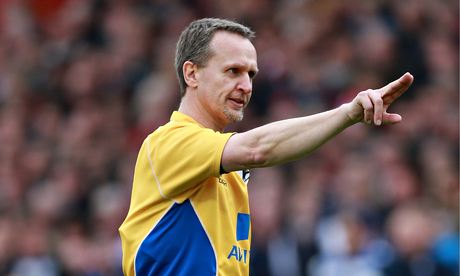
Owen Farrell's first try for England, against Australia at Twickenham last November, was scored at virtually the same spot where Benson Stanley touched down for Clermont Auvergne against Saracens in last weekend's Heineken Cup semi-final.
There had been an obstruction in the buildup to both tries: Dylan Hartley blocked his opposite number Stephen Moore as Farrell found a path to the line, while Damien Chouly clattered into Farrell as Sitiveni Sivivatu was preparing to pass to Stanley outside him. The television match official was called on to adjudicate on each occasion.
Farrell's try stood with the TMO arguing that while Hartley had impeded Moore, the defender would not have been able to prevent the score had he been given a free run. Last Saturday, the decision was different: Chouly was deemed to have obstructed Farrell and it was his intent, trying to secure an advantage unfairly, that was deemed germane, not whether Farrell had been in a position to stop Stanley.
Two very similar incidents but contrasting outcomes.
The role of the TMO is being monitored by the International Rugby Board, which does not want matches in next year's World Cup to be continually interrupted by referees asking for clarification before making a decision: since the widening of the original remit of a video referee from whether a player had grounded the ball over an opponent's line, it is not uncommon for a match to end more than two hours after it has started, especially at club level.
The intention behind the introduction of the TMO was to help referees in matters of fact: whether a try had been scored or a pass was forward, or an act of foul play had been committed. Broadening the scope has a blurring effect: whether Moore, for example, had a chance or not of tackling Farrell and possibly stopping what turned out to be the match-winning try is immaterial. If Hartley had committed an act that was worthy of a penalty against him, the try should not have been awarded.
Last Saturday's decision against Chouly was objective: he had taken out Farrell and the act merited a penalty to Saracens regardless of whether Stanley would have scored anyway. The intention of the flanker was to secure an advantage by a means contrary to the laws and what he did was where the role of the TMO started and ended.
The recent Premiership match between Harlequins and Leicester at the Stoop saw so many referrals to the TMO that the match lasted more than two hours and the crowd became increasingly irritated. The referee that evening, Tim Wigglesworth, sought guidance repeatedly, perhaps understandably after his vexing time at Gloucester six days before in the West Country derby, but the following day at Twickenham, Wayne Barnes trusted more in his own eyes, as he did in Marseille last Sunday when awarding Simon Zebo a try having had a better view than any of the cameras.
A question for the IRB is whether referees, in general, are using the TMO system as it was intended or are regarding it as a primary, rather than a last, resort. It appears more of an issue at club level, with leading officials such as Nigel Owens, Barnes and Romain Poite using the system as an aid rather than a crutch.
The system has not, though, eliminated mistakes or ambiguity. It is not rare for decisions to be greeted with incredulity by spectators, and not just those relating to forward passes. And there are times when referrals are made over whether a player had put a foot in touch before putting the ball down when a touch judge is standing a couple of feet away, perfectly placed to make a decision.
There are times, such as Steffon Armitage's 'try' against Munster last Sunday when the time between a player's foot scraping the touchline and the acting of the ball being grounded is so short that it is horribly hard for a touch judge to decide one way or the other. But it is more common for a TMO to be called to adjudicate when there should be no cause for doubt, like a stranded batsman finding himself watching a big screen before being given run out.
The IRB is aware of the debt it owes television. The longer matches last, the greater the danger that they overrun a broadcaster's schedule, something it will be mindful of in Britain with ITV having the rights here for the World Cup, although the company will have to make provision for extra-time in the knockout stage.
Once the IRB had introduced the TMO, it was inevitable that the scope would be widened: ruling that a ball had been grounded was one thing, but if the try had resulted from a clearly forward pass then a mistake had not been eliminated.
Yet mistakes still happen. What players and spectators need from referees is consistency and when a TMO starts to assume that role, as happened in the Hartley-Moore incident, inconsistency creeps in. The person with the whistle has to be the sole judge of fact.
Owens used the big screen at Twickenham last weekend before deciding that Brock James deserved a red card for deliberately flicking the ball out of play with his hand and that the act was worthy of a penalty try, although to say that Saracens would probably have scored a try but for the outside-half's mischief appeared a leap of faith.
They were Owens's unguided decisions and instead of the TMO, perhaps rugby union could follow American Football and allow the referee to view an incident himself. Either that or abandon the system as Too Much Obfuscation and revert to the old one when referees relied on themselves and their touch judges. A shade of grey rather than a black and white world.
• This is an extract taken from the Breakdown, the Guardian's weekly rugby union email. Click here to subscribe

